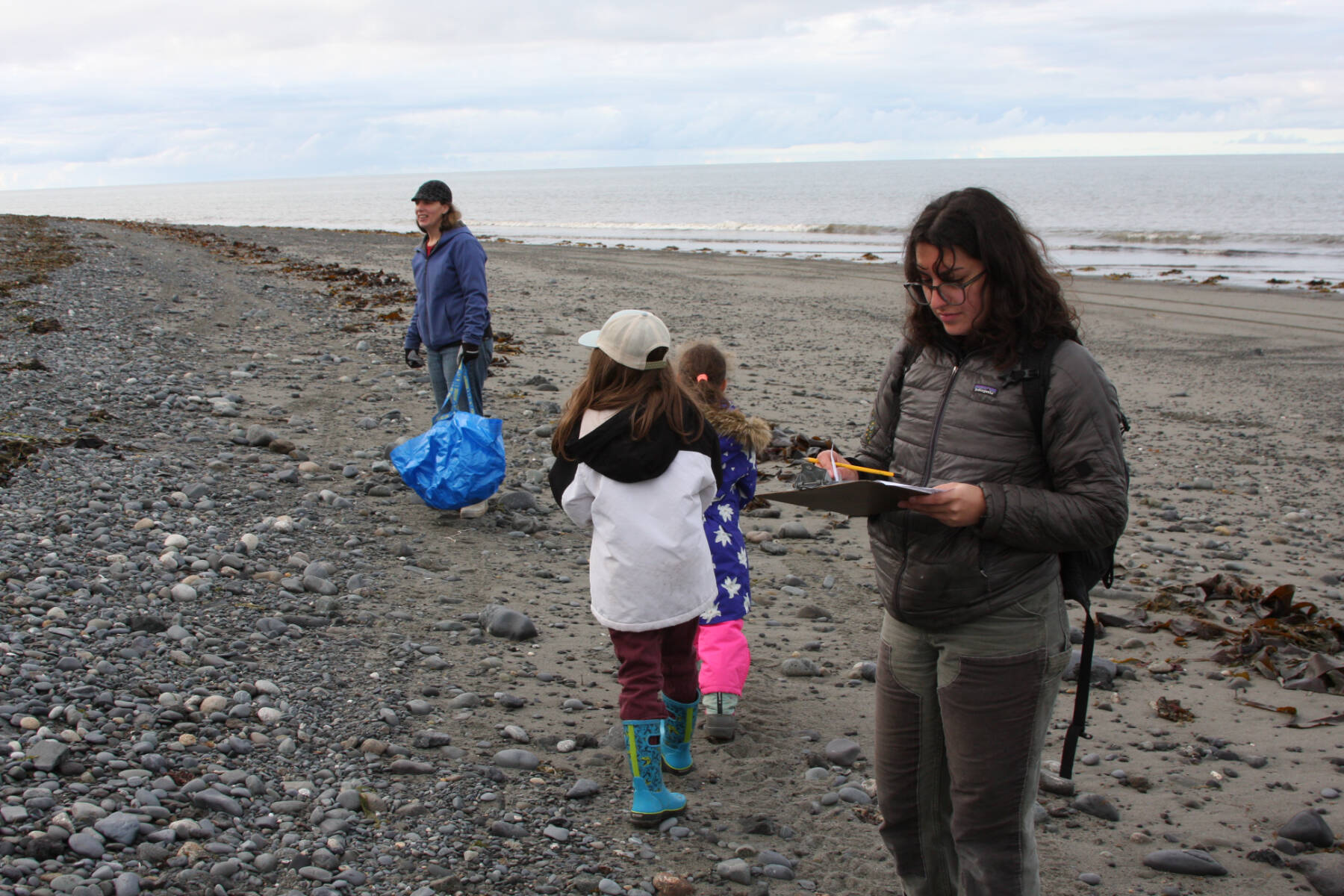About a dozen local community members, in partnership with the Center for Alaskan Coastal Studies, set out Saturday morning to comb the beach at the Anchor River State Recreation Area. This group wasn’t looking for seashells, however — armed with gloves, bags and waterproof boots, they worked to remove marine debris from another vital Kachemak Bay habitat.
Part of CACS’s annual CoastWalk environmental monitoring events, the community cleanup in Anchor Point was the fourth conducted so far this fall. Volunteers divided into three roles — trash pickers, bag holders and data collectors — and worked their way from the recreation area parking lot south toward the Halibut Campground. They ended up collecting a total 270 items of debris, weighing 23 pounds and 14 ounces from the Anchor Point beach.
Three earlier CoastWalk cleanups took place at the end of the Homer Spit, in Seldovia and at Glacier Spit. CACS has also conducted multiple cleanup events working with students from Chapman School, West Homer Elementary and McNeil Canyon Elementary.
2023 marks the 40th year that CACS has been conducting CoastWalks around the Kachemak Bay. The Anchor Point beach was one of the four beaches cleaned and monitored in the original CoastWalk conducted in 1984, according to the CACS website.
“It’s very typical for us to be on the Anchor Point beach,” CoastWalk coordinator Henry Reiske told Homer News on Saturday. “Center for Alaskan Coastal Studies in based out of Homer, but we want all of Kachemak Bay to be involved.”
Reiske noted that the debris picked up at the Anchor Point beach frequently looks different than other monitored locations.
“It’s at the tip of Kachemak Bay, rather than in the middle of Kachemak Bay,” he said. “But we always try to get out to Anchor Point every year, whether with school groups or as a community cleanup, because it’s accessible.”
Wynn Visitor Center Maya Nabipoor, who led the Anchor Point CoastWalk on Saturday, noted that they’ve been finding lower levels of trash on the beaches than expected.
“Tentatively, yes,” Reiske said Saturday afternoon. “I’ve been on a few cleanups so far with lighter loads than we were expecting to pull off. We’re still finding a fair amount (of debris).”
He described a school group cleanup at the Grewingk Glacier Spit, where students from Chapman School found “8 pounds total” of marine debris.
“The question is, is there less (debris) getting out there, or are there more people cleaning?” he said. “Either result is great, it’s what we want — but which one is it?”
Debris picked up during monitoring events is reported by weight and by item count in order to provide a fuller picture.
Reiske said that during another school cleanup event on Friday with West Homer Elementary’s fifth grade class, students picked up 20 pounds of trash off the end of the Spit, but no large items were collected.
“It was all cigarettes, tiny pieces of plastic, food wrappers,” he said. “We did the Seafarers’ Memorial, around the end of the Spit, and a portion of the harbor. We split into three groups; the harbor group made it from Ramp 1 to halfway to Ramp 3 — it’s not a long distance, but they were down there for over an hour. The really tiny stuff is insidious because it gets into the water system, so it’s important to grab.”
According to Reiske, the three items most consistently picked up during cleanups are small foam pieces, cigarette butts and food wrappers.
“Nails are also common,” he said. “But those are from one event — people burning pallets on the beach.”
Two more community CoastWalk cleanups are scheduled for the next couple weekends.
On Saturday, Sept. 30, join CACS naturalists at the Water Trail Pavilion on the Homer Spit for a guided tide pooling session from 9-10:30 a.m., then work to clean up marine debris from 10:30 a.m. to noon.
On Saturday, Oct. 7, meet at the Diamond Creek trailhead at 10 a.m. and join CACS for a short hike to the beach at the mouth of Diamond Creek where volunteers will clean up marine debris and collect environmental data.
Transportation is available to the CoastWalk designated locations from CACS headquarters at 708 Smoky Bay Way. Visit www.facebook.com/ConnectingUwiththeNatureofAlaskasince1982/ for more information, or contact CoastWalk coordinator Henry Reiske at 907-235-6741 or henry@akcoastalstudies.org. Advance sign-ups are welcome, though not required; anyone may drop in to participate in the community cleanup days and caring for Homer’s marine environment.


